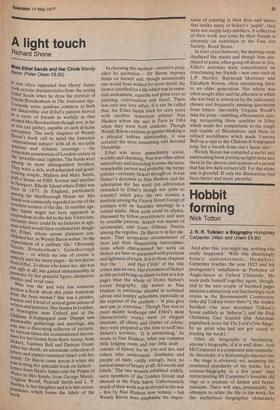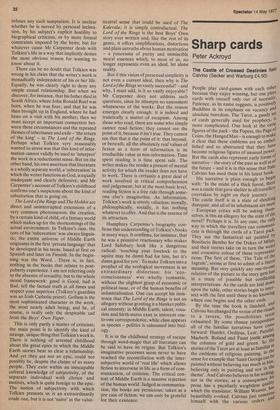Hobbit forming
Nick Totton
J. R. R. Tolkien: a Biography Humphrey Carpenter (Allen and Unwin £4.95)
'And after this, you might say, nothing else really happened.' With this disarmingly honest announcement, Humphrey Carpenter reaches the year 1925 and his protagonist's installation as Professor of Anglo-Saxon at Oxford University. He soon pulls himself together again, though, and in the next couple of hundred pages analyses exhaustively and fascinatingly such cruxes as the Bournemouth Controversy (why did Tolkien retire there?), the Auden Incident (the poet described Tolkien's house publicly as 'hideous'), and the Pink Christmas Tree Scandal (the American paperback cover for The Lord of the Rings, by an artist who had not got round to reading the book).
After all, biography is fascinating: anyone's biography, if it is well done. And Mr Carpenter is a competent and sympathetic chronicler, if a frustratingly discreet one — the stage is obviously set, assuming the continued popularity of the books, for a counter-biography in a few years' time reinterpreting Mr Carpenter's loveable old sage as a creature of darker and fiercer passions. There will also, presumably, be attempts to relate the life to the work; for the authorised biographer obdurately
refuses any such temptation. It is unclear whether he is moved by personal inclination, by his subject's explicit hostility to biographical criticism, or by more formal constraints imposed by the heirs; but for whatever cause Mr Carpenter deals with Tolkien's life in a way that implicitly denies the most obvious reason for wanting to know about it.
There can be no doubt that Tolkien was wrong in his claim that the writer's work is monadically independent of his or her life. Equally, he was clearly right to deny any simple causal relationship. But when we discover, for instance, that his father died in South Africa, where John Ronald Ruel was born, when he was four; and that he was then brought up in England, where he had been on a visit with his mother; then we must accept an important connection between these circumstances and the repeated themes of inheritance and exile — 'the return of the king' — in The Lord of the Rings. Perhaps what Tolkien very reasonably wanted to stress was that this kind of information cannot validly be used to 'interpret' the work in a reductionist sense. But on the other hand, his own assertion that literature is a wholly separate world, a `subcreation' in which the writer functions as God, is eqUally inadequate and clearly defensive; and Mr Carpenter's account of Tolkien's childhood confirms one's suspicions about the kind of substitution that is going on.
The Lord of the Rings and The Hobbit are direct and uninterrupted extensions of a very common phenomenon: the creation, by a certain kind of child, of a fantasy world which makes up for the shortcomings of the actual environment. In Tolkien's case, the core of his 'subcreation' was always linguistic; the entire universe of Middle Earth originates in the first 'private language' that he developed in his teens, based at first on Spanish and later on Finnish. In the beginning was the Word. . .There is, in fact, _nothing in the books that relates to postpuberty experience. I am not referring only to the absence of sexuality, but to the whole moral framework: good is Good, bad is Bad, tell the factual truth at all times and respect your superiors (Tolkien's guardian was an Irish Catholic priest). Gollum is the most sophisticated character in the work, the most nearly adult being; and he, of course, is really only the despicable cad from the Boys' Own Paper.
This is only partly a matter of criticism; the main point is to identify the kind of strange, unique thing that Tolkien's work is. There is nothing of arrested childhood about the great epics to which the Middle Earth stories bear so clear a relationship. And yet they are not an epic, could not possibly be, despite the claims of so many people. They exist within an inescapable cultural knowledge of subjectivity, of the separate individual with choice and motives, which is quite foreign to the epic. The notion of subjectivity with which Tolkien presents us is an extraordinarily crude one, but it is not 'naive' in the value neutral sense that could be used of The Kalevala; it is simply contrafactual. The Lord of the Rings is the best Boys' Own story ever written and, like the rest of its genre, it offers simplifications, distortions and plain untruths about human motivation — a panorama of purity and immiscible moral essences which, to most of us, no longer represents even an ideal, let alone reality.
But if this vision of presexual simplicity is not even a current ideal, then why is The Lord of the Rings so vastly successful? — and why, I must add, is it so vastly enjoyable? Mr Carpenter does not address such questions, since he attempts no assessment whatsoever of the works. But the reason emerges clearly enough: it is indeed and truistically a matter of escapism. Among those who read, there are some who simply cannot read fiction; they cannot see the point of it, because it isn't true. They cannot see that that is the point of it: that beyond, or beneath, all the absolutely rearvalues of fiction as a form of information is its irreducible value as non-information. Time spent reading it is time spent safe. The writer makes the reader a present of mental activity for which the reader does not have to work. There is certainly a great deal of work involved in critical comprehension and judgement; but at the most basic level, reading fiction is a free ride through someone else's imagination. As information, Tolkien's work is utterly valueless: morally, philosophically, socially, it has nothing whatever to offer. And that is the essence of its attraction.
Humphrey Carpenter's biography confirms this understanding of Tolkien's books in many ways. It confirms, for instance, that he was a primitive reactionary who makes Lord Salisbury look like a dangerous radical: 'touching your forelock to the squire may be damn bad for him, but it's damn good for you'. To make Tolkien into a prophet of the ecological movement is an extraordinary distortion: his 'ecoconsciousness' was wholly romantic, without the slightest grasp of economic or political issue, or of the human benefits of industrialisation. One can accept his insistence that The Lord of the Rings is not an allegory without granting it a blanket political amnesty: in Middle Earth, talent, vocation and birth-status exist in innocent oneto-one correspondence, while class appears as species — politics is subsumed into biology.
It is in the childhood strategy of escape through word-magic that all literature can be said to have its origins. But Tolkien's imaginative processes seem never to have reached the reconciliation with the intersubjective world of 'real life' which allows fiction to intervene in life as a form of communication, of criticism. The critical content of Middle Earth is a massive rejection of the human world. Judged as communication, the books are pernicious: taken as a pre case of fiction, we can only be grateful for their existence.



































 Previous page
Previous page